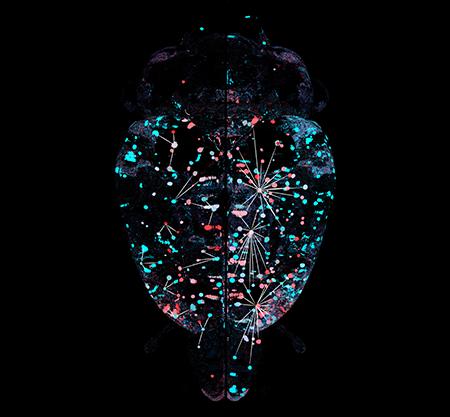Novel imaging technologies produce first whole-brain atlas at single-cell resolution, revealing how alcohol addiction — and abstinence — change neural physiology and affect previously unsuspected regions of the brain

Credit: UC San Diego Health Sciences
Employing advanced technologies that allow whole brain imaging at single-cell resolution, researchers at University of California San Diego School of Medicine report that in an alcohol-dependent mouse model, the rodent brain’s functional architecture is substantially remodeled. But when deprived of alcohol, the mice displayed increased coordinated brain activity and reduced modularity compared to nondrinker or casual drinker mice.
The findings, published in the January 14, 2020 online issue of PNAS, also identified several previously unsuspected regions of the brain relevant to alcohol consumption, providing new research targets for better understanding and treatment of alcohol dependence in humans.
“The neuroscience of addiction has made tremendous progress, but the focus has always been on a limited number of brain circuits and neurotransmitters, primarily dopaminergic neurons, the amygdala and the prefrontal cortex,” said senior author Olivier George, PhD, associate professor in the Department of Psychiatry at UC San Diego School of Medicine.
“Research groups have been fighting for years about whether ‘their’ brain circuit is the key to addiction. Our results confirm these regions are important, but the fact that we see such a massive remodeling of the functional brain architecture was a real shock. It’s like studying the solar system and then discovering that there is an entire universe behind it. It shows that if you really want to understand the neurobiological mechanisms leading to addiction, you can’t just look at a handful of brain regions, you need to look at the entire brain, you need to take a step back and consider the whole organ.”
George said the findings further undermine the idea that addiction is simply a psychological condition or consequence of lifestyle. “You would be surprised at how prevalent this view remains,” he said. “The brain-wide remodeling of the functional architecture observed here is not ‘normal.’ It is not observed in a naïve animal. It is not observed in an animal that drinks recreationally. It is only observed in animals with a history of alcohol dependence and it is massive. Such a decrease in brain modularity has been observed in numerous brain disorders, including Alzheimer’s disease, traumatic brain injury and seizure disorders.”
Brain modularity is the theory that there are functionally specialized regions in the brain responsible for different, specific cognitive processes. For example, the frontal lobes of the human brain are involved in executive functions, such as reasoning and planning, while the fusiform face area located in the lower rear of the brain is involved in recognizing faces.
Reduced modularity, said George, likely interferes with “normal neuronal activity and information processing and contributes to cognitive impairment, emotional distress and intense craving observed in mice during abstinence from alcohol.”
Due to the format of the testing, George said it was not clear if the reduced modularity was permanent. “So far, we only know that it lasts at least one week into abstinence. We have not tested longer durations of abstinence, but it’s one of our goals.”
George and colleagues used multiple new and emerging imaging technologies to create their whole-brain atlas of mouse brains, capable of being viewed at the level of single cells. The result was a first, they said, providing unprecedented data and insights.
“This new approach allows us to explore an entirely new universe. It can answer so many questions. What I am most interested in now is figuring out how early these brain changes start and how long do they last for. This would be critical to understanding when the switch to addiction happens and when does your brain come back to normal, if it ever does. We are also very interested in comparing the brain network of alcohol dependence with other drugs, such as cocaine, nicotine and methamphetamines.”
The imaging approach cannot yet be used with human brains, which are far larger and more complex. “I don’t think that it is possible to do it in humans now, the technology is just not there,” said George. “But when I started doing this research 15 years ago, this technique didn’t exist at all and I never ever imagined it would be possible, so who knows what the future will bring.”
###
Co-authors include: Adam Kimbrough, UC San Diego; Daniel J. Lurie and Mark D’Esposito, UC Berkeley; Andres Collazo, California Institute of Technology; and Max Kreifeldt, Harpreet Sidhu, Giovana Camila Macedo and Candice Contet, The Scripps Research Institute.
Disclosure: Olivier George’s spouse is owner of Simply-Lab, LLC and has equity interest.
Media Contact
Scott LaFee
[email protected]
858-249-0456
Related Journal Article
http://dx.




